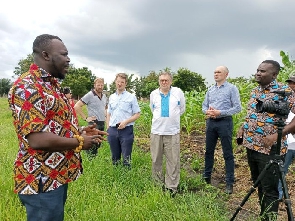 Ukrainian government delegation interacted with rice farmers at Akatsi.
Ukrainian government delegation interacted with rice farmers at Akatsi.
Rice farmers in the Akatsi South District of the Volta region are in distress as prices of farm inputs skyrocket. Some of the farmers have abandoned their farms due to the high cost of production and those in business fear there would be poor yields during the harvest season because they cannot afford adequate fertilizers for their farms. They are therefore appealing for support and assistance to be able to bounce back into business. They made the point when a Ukrainian government delegation interacted with the farmers at Akatsi. The Ukrainian government delegation is on a fact-finding mission to ascertain the plight of the farmers as a result of the Russia-Ukraine war. Ukraine is a major exporter of fertilizer to Ghana. The Volta Region is thus noted for its high rice production rate in Ghana. The region thus contributes huge tonnes of paddy rice to the country’s rice production capacity. According to the farmers even though the rainfall pattern has been favourable this year, their major challenges are the high prices of fertilizer and other agricultural inputs. The Chairman of the local rice farmers Association, Richard Odzor said most farmers cannot afford to buy fertilizers, a situation which will have negative impact on their yields. He noted that previous years saw them producing huge tonnes of rice, due to government subsidies on fertilizers, but such incentives have been scrapped. “Most of the farmers quit the business because they don’t have capital or money to buy the inputs. So few farmers try their best to still be in the business. As you can see the rice on this field needs fertilizer and now the fertilizer Uriah one bag costs 500 Ghana cedis and unfortunately that 500 Ghana cedis too the fertilizer itself is not in the system to buy,” he added. The Ukrainian government delegation has been in the country to engage the Ghanaian government on the effects of the Russian-Ukraine War on key sectors of the economy and the way forward. After a tour of some rice farms in the district, a member of the delegation, Oleg Nivievskyi said fertilizer production levels have dropped significantly in Ukraine, and export channels have been blocked due to the Russia invasion. “The war in Ukraine challenges International rules of trade. Trade is what is needed to bring fertilizers from other countries to Ghana and this is not happening right now because Russia challenges that. Things have to be restored so that the trade can also begin smoothly between Ghana and her partners and respect for trade rules and not by uncertain behaviour of Russia as we are seeing.” Another member of the delegation, Olexiy Haran thanked the Ghanaian government for their support and empathy for the people of Ukraine who have been devastated by the war.
Rice farmers in the Akatsi South District of the Volta region are in distress as prices of farm inputs skyrocket. Some of the farmers have abandoned their farms due to the high cost of production and those in business fear there would be poor yields during the harvest season because they cannot afford adequate fertilizers for their farms. They are therefore appealing for support and assistance to be able to bounce back into business. They made the point when a Ukrainian government delegation interacted with the farmers at Akatsi. The Ukrainian government delegation is on a fact-finding mission to ascertain the plight of the farmers as a result of the Russia-Ukraine war. Ukraine is a major exporter of fertilizer to Ghana. The Volta Region is thus noted for its high rice production rate in Ghana. The region thus contributes huge tonnes of paddy rice to the country’s rice production capacity. According to the farmers even though the rainfall pattern has been favourable this year, their major challenges are the high prices of fertilizer and other agricultural inputs. The Chairman of the local rice farmers Association, Richard Odzor said most farmers cannot afford to buy fertilizers, a situation which will have negative impact on their yields. He noted that previous years saw them producing huge tonnes of rice, due to government subsidies on fertilizers, but such incentives have been scrapped. “Most of the farmers quit the business because they don’t have capital or money to buy the inputs. So few farmers try their best to still be in the business. As you can see the rice on this field needs fertilizer and now the fertilizer Uriah one bag costs 500 Ghana cedis and unfortunately that 500 Ghana cedis too the fertilizer itself is not in the system to buy,” he added. The Ukrainian government delegation has been in the country to engage the Ghanaian government on the effects of the Russian-Ukraine War on key sectors of the economy and the way forward. After a tour of some rice farms in the district, a member of the delegation, Oleg Nivievskyi said fertilizer production levels have dropped significantly in Ukraine, and export channels have been blocked due to the Russia invasion. “The war in Ukraine challenges International rules of trade. Trade is what is needed to bring fertilizers from other countries to Ghana and this is not happening right now because Russia challenges that. Things have to be restored so that the trade can also begin smoothly between Ghana and her partners and respect for trade rules and not by uncertain behaviour of Russia as we are seeing.” Another member of the delegation, Olexiy Haran thanked the Ghanaian government for their support and empathy for the people of Ukraine who have been devastated by the war.